Horse trekking through the Coromandel
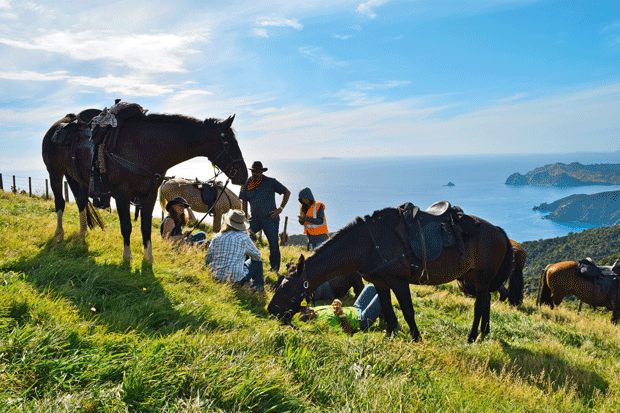
There may be a few hills to climb and you could well be subjected to a little karaoke, but this trek through some of New Zealand’s best scenery does good in more than one sense.
WORDS: PAMELA WADE
“These horses think they’re in a race,” says Lindsay in apology as Bobbie and her paddock buddy Shine hustle past yet another set of riders, ignoring efforts to rein them in. It is to become something of a refrain this sparkling March day – not knowing they are in it for the long haul, the two horses jig-jog eagerly away from the start of our Tour de Coromandel trek.
Little Coromandel town, its main street lined with wide verandas and peaked wooden frontages, always looks like something from the Wild West and with about 60 horses clattering through, many of their riders sitting on western saddles and wearing cowboy hats, the image is complete. Locals and tourists stop and stare, children wave excitedly and we wave back. Not to be outdone in friendly gestures, the horses make generous contributions to the town’s gardeners.
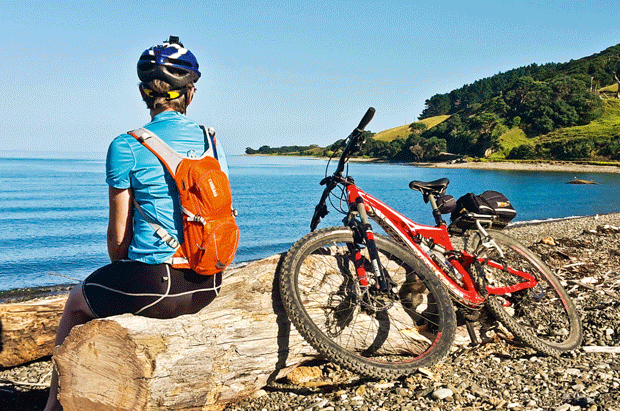
On the road ahead are a handful of mountain bikers, two runners and a couple of doughty walkers. All of us are embarking on a six-day trek around the top of the peninsula. The tour is the latest fund-raising brainchild of Steve Old, whose mother died of multiple sclerosis: the Malaghan Institute of Medical Research in Wellington, which investigates ways to improve treatments and therapies for this relatively common but still mysterious disease, is the beneficiary. Over the years Steve has organized many treks with this purpose, including setting up the Great New Zealand Trek, now in its 11th year, from Cape Reinga to Bluff in 14 annual stages.
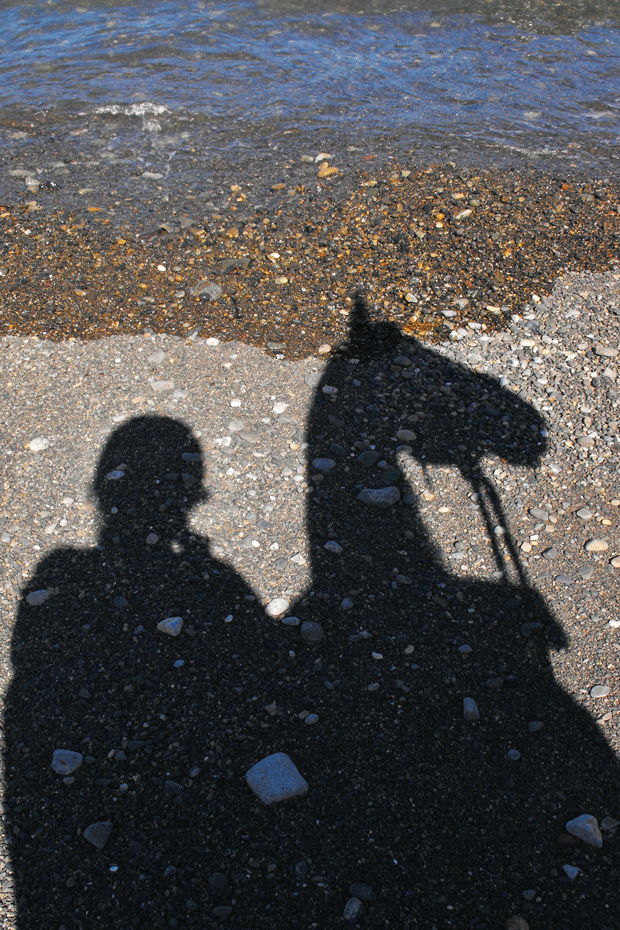
Fifty-plus original participants still turn up on that trek every February, three of them with their same horse; and 10 of those veterans raise their hands at our first evening muster in the marquee the night before. We have come from throughout the North Island – from Taranaki, Manawatu, Northland, Auckland. One of the volunteers has even flown up especially from Christchurch. There are riders barely out of their teens and two men of 74; farming folk and office workers, newbies and very old hands.
Enthusiasm is what we all have in common as we clatter out of town and up the first big hill.
Enthusiasm for the scenery, for sunshine and fresh air, for long views won by sturdy effort up the hills — but mainly for getting out there and taking on each day’s challenges in the company of kindred spirits. Again and again during the week, people echo cyclist Shoana: “Life’s too short to be sedentary. You miss too much.”
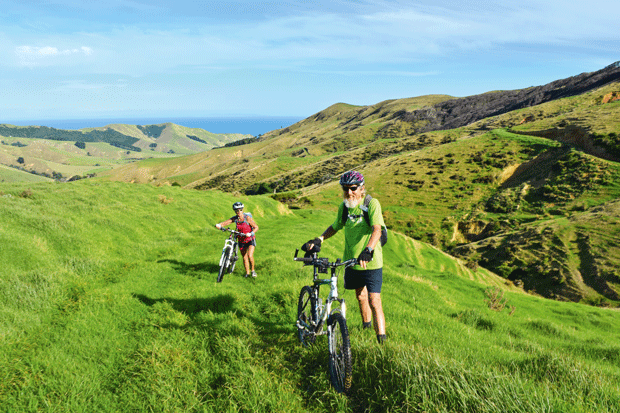
Several times the first home and winner of the fun competition for the day’s yellow T-shirt — the reason for the trek’s Tour de Coromandel title — she’s in awe of fellow biker Colin, aged 74 and conceding only that he will consider getting himself an e-bike for his 80th birthday.
As the road climbs up and up that first morning perhaps the self-powered participants may be thinking that they would prefer something a little more forgiving, but no one is admitting it and the reward does come at the top of the hill. Here we leave the road for a downhill track through the bush – secret, green and fluttering with butterflies with views out over the blue and silver Hauraki Gulf. Then come dramatic granite outcrops, lush pasture punctuated by cabbage trees, clear creeks, curious cattle and, finally, Colville.
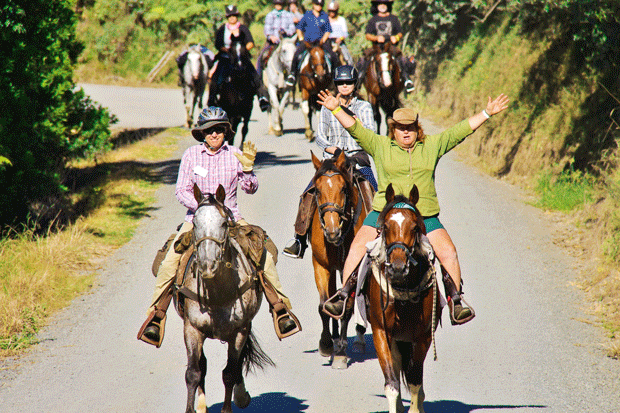
It’s a blip of a place, but there are treasures here: the barn-red General Store, selling everything from a mung bean to a galvanized nail; the coffee shop with its home-made neenish tarts and basket of weirdly-shaped vegetables; the curve of the creek at our farm campsite where we relish the cool water in blissful ignorance of the eels we later learn were sharing the swimming hole with us.
And then, after dinner that night — three meal choices so delicious that everyone eats some of each — there is entertainment in the Colville Hall. The local warm-up band is enjoyably dreadful and sets us up for a main act that has everyone on the dance floor showing off their moves. There’s even complimentary banana cake.
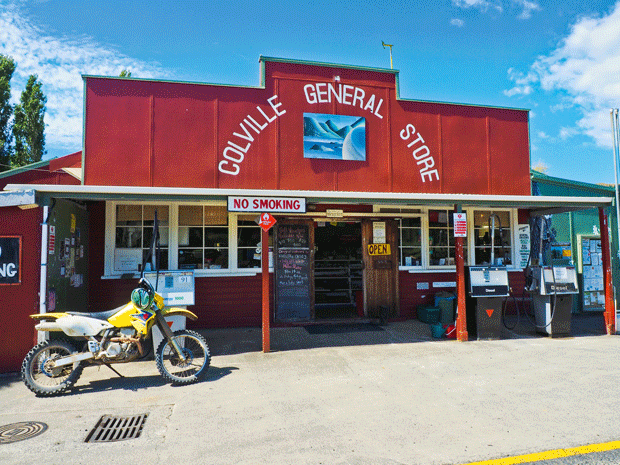
After a night in tents beside the creek, occasional plops in the water from the eels punctuating the stillness, we wake to the misty dawn of a day that brings spectacular beauty. Everyone is stunned by the pristine glory of the Pohutukawa Coast and no one wants to hurry. “Soak it up,” says the man in the Akubra hat, as his horse crunches along the stony beach where we have stopped for a swim. Air-clear water, tinged with blue, laps onto smooth pebbles arcing in a graceful curve around the bay. Huge, old, artistically sprawling pohutukawa trees hang over the beach, throwing sharp shadows on this perfect morning. A pied shag dries its wings in the sun; a stingray flaps in the shallows.
A climb up over farmland with long views out to Little Barrier and Great Barrier Islands brings us to Port Jackson. A baby plays in the gravel in his dusty nappy as his parents, our hosts on this farmland, watch the horses being hosed off and the farrier replacing a lost shoe. The tireless volunteers have already erected the marquee, set up the toilets, showers and massage tent, and mouth-watering smells are starting to drift out of the kitchen.
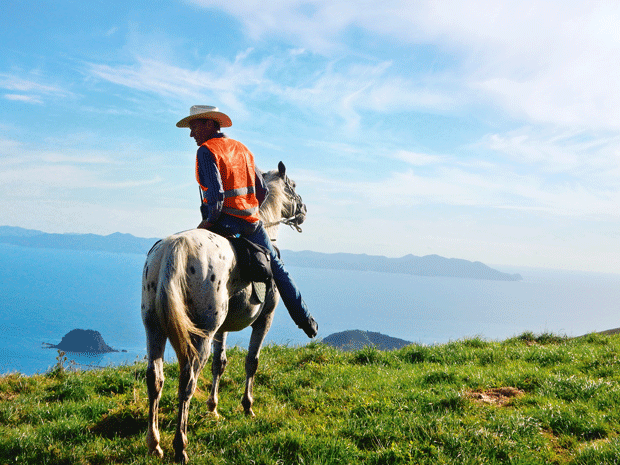
With the horses washed and fed and our tents erected along the shore line, Lindsay builds a clothes line from silvered driftwood to dry saddle blankets rinsed out in the creek; Shoana meticulously cleans her bike chain. Arriving last into camp, the walkers are compensated by having no chores to do. Finally, the day’s effort is over for us all. We swim, laze in the sun, nap, drink beer, wine and tea and chat. This is the pattern.
There is also simple fun. We laugh at ourselves in the evening slideshow of the marshals’ photos; at Jay starting his karaoke show with a cheerful, “If you have any requests, hard luck, I sing what I can sing”; at Steve clowning his way through the auction of donated goods, from a week in Queenstown to a stuffed toy horse; at Lindsay finding naked ladies in his sleeping bag — the flower variety.
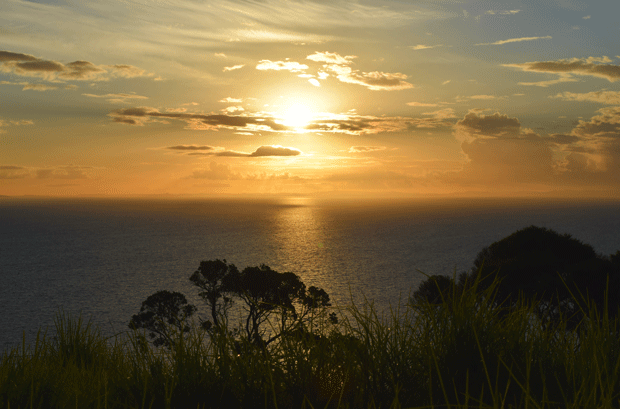
We marvel at the runners, completing almost a marathon in one day; at Patricia, a walker of a certain age and impressive fitness; at the medic’s fancy trailer; at the crackling on chef Ivan’s spit-roast porker.
Finally, after six days and 120 kilometres of bush, beach and farmland, road and track, of effort and rest, music and dancing, jokes and generosity, of sunshine and showers and outstanding natural beauty, we clatter back into Coromandel town. This time there’s only a man with a shovel to greet us but we don’t mind. We’ve just done something unforgettable.
Notebook
The trek is an annual event. Riders, bikers and walkers/runners will follow a different North Island route each year. Participant numbers will be capped at 150. The 2017 event, along the Waikato Coast, will be called the Western Windmills Tour. It will take place on 11–19 February and entry fees are $1650 for riders and $1550 for bikers and walkers. All profits from the event and funds raised in the auction go to the Malaghan Institute for research into multiple sclerosis.
Reasonable fitness is important (especially for bikers and walkers) to cope with hills and distances of up to 30 kilometres daily. Horses are available for hire at approximately $750 for the week. Camping packages can also be purchased by those without tents or the desire to erect their own.
Further details and contacts are at trekkingevents.co.nz
Love this story? Subscribe now!
 This article first appeared in NZ Life & Leisure Magazine.
This article first appeared in NZ Life & Leisure Magazine.
